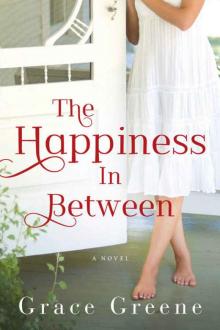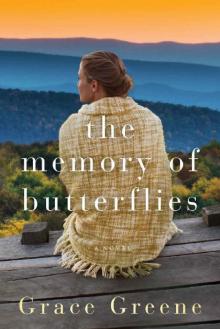- Home
- Grace Greene
The Happiness in Between Page 25
The Happiness in Between Read online
Page 25
“I didn’t realize. But, Sandra, if there’s any chance you might go back to him again . . .”
“I deserve that. I do, but no. I feel like I’m thinking for myself for the first time in years. I’ve tried to handle this on my own. I know you didn’t want to be involved again.”
“No. That’s not it. You blamed us for teaching you to be ‘nice’ but not how to survive the real world, remember? For the record, I disagree. I think you simply were . . . are nice—a nice person who doesn’t like to deal with unpleasantness. But you can’t spend your life running away or hiding from trouble. I wanted you to see you could manage on your own.” She put her hand to her heart. “Your dad and I won’t always be here to take care of you, but we will always love you.”
“You see me as a failure.”
“Not as a failure. But you haven’t found your potential, either.”
“My potential?”
“Your happiness. Everyone has something that feeds them, gives them emotional happiness. You’ve never had that. I thought you’d find it given time and maturity.” She pressed her hand on the damp towel again while holding her daughter’s arm. “What makes you happy, Sandra?”
“I was happy this morning.” She looked across the room. “The sun was slanting into the room through the window, and Honey was waking me with her wet nose. I’m sorry I didn’t find a successful profession . . . any profession. I’m sorry I dropped out of college. It didn’t fit. But if I’d tried harder, maybe . . . And I couldn’t make a successful marriage. I wanted to be happy with my husband. I tried.” Sandra put her hand on her mother’s. “Don’t say it. I know we can’t rely on others for our happiness. Is it so terrible that I’m a thirty-year-old woman with no ambition? No ideas, no work, no hobbies. How can that be?” She sighed. “I do know that I wanted a marriage that was forever. I wanted a happily-ever-after. I’m certain Trent did, too. But our visions of what that meant didn’t mesh. Now I understand they never could.”
“So what now?”
“A protective order.”
“Of course, but I mean about you being out here. It’s isolated.”
“You think I should leave?”
She looked away and then back at Sandra. “You could come to Florida.”
Sandra opened her mouth to speak, closed it, then opened it again. Finally, she shook her head.
“I thought you were afraid?” Mom said.
“I am afraid, but it doesn’t matter. Trent can’t win this time. He gets into my head. That’s where the fear is, and I start doubting myself. I have to stand up to him. He’s a bully, that’s all.”
“I don’t like any of this, but I’ll be honest, Sandra.” She sighed. “I don’t want you to join us in Florida. You don’t belong there.”
It hurt, it truly did. Sandra’s eyes burned. She kept her hands away and wouldn’t rub them or cover her face. Instead, she looked down at the floor. “I know that. You didn’t exactly hide it before.”
She felt her mother’s hand on her shoulder.
“No, Sandra, listen to me. You misunderstand. You’ve wasted a decade of your life with Trent. I watched my sister and brother waste their best years. Cliff stayed because he wanted what he couldn’t have. Barbara stayed to care for our parents. By the time our mother died, Barbara didn’t think she could do anything else with her life, that it was too late for her. I don’t want that to be you. I don’t want you to go from Trent to Florida, where you’ll spend the next couple of decades taking care of your dad and me. I want you to find your own happiness.
“Your father . . . I’ve been gone a lot in a short time. Barbara’s good with him, thank goodness, but this is hard on him. Everything is, including the move, but he would want me to put you first.”
Sandra patted her mother’s hand. “I’ll be fine. I don’t have it all worked out, but now that I can move forward with the divorce, I can make it work. I can withstand him. And, Mom, one day, I promise, I’m going to make you and Dad proud.”
“We were always proud, but we also want you to be happy as the person you are, not trying to fit who you think you should be or who people want you to be.”
“Uncle Cliff said he and I didn’t fit in.”
“Uncle Cliff didn’t want to fit in. All he wanted to do was farm, and when that no longer worked, he was a man without a dream. He died of exposure, Sandra. Drunken. Facedown in the dirt. They found him a day later.” She paused. “I hate to say this, but Barbara found him at the schoolhouse. It wasn’t pretty, and she doesn’t sleep well. She has nightmares. I don’t care what your dream is—or I do, but what I truly care about is that you have a dream to guide you, to aspire to. Without that, people are . . . lost. No one can give it to you. Find it, Sandra. Not in someone else, but in yourself.”
“Mom,” she said. “I found the butterfly picture. The orange monarchs in the shadow frame.”
Her mother nodded. “Yes.”
“Cliff’s name is on the back. Who painted those?”
Mom looked at the floor, at Honey, and around the room. Finally, her gaze came to rest on Sandra’s face. Her mother’s eyes were so sad, Sandra almost stopped her from speaking.
“Cliff,” Mom began, but then paused. “Barbara was always the artist. People praised her. As long as it didn’t interfere with her household duties, our parents encouraged her to pursue it. Cliff was two years younger. He drew a little, but no one paid much attention because even as a child he helped our father with the farm. That was Cliff’s job. And farming is all-consuming. Do you understand that?”
Sandra nodded.
“He got sick when he was fifteen, something with his lungs, and was confined to bed for a few weeks. No one knew he was painting the butterflies until they were done.” Mom paused again and sighed. “When he gave them to our mother, instead of praise, our father made it clear that Cliff’s job was the farm. It was one thing for Barbara to dabble, but Cliff needed to keep his attention where it belonged.” Her voice dropped almost to a whisper. “I remember how he walked away. He never mentioned it again. I wish . . .”
“What do you wish?”
“I wish we’d spoken up for him. I wish he’d had the chance to pursue art if that’s what he wanted. But we didn’t. When the farm started failing, I tried to interest him in painting again, but he wouldn’t hear of it. And you saw what became of him.” She squeezed Sandra’s hand. “If we had done more back then, he might still have had something to care about, to engage him in life later.”
Her mother breathed in slowly, then sighed again. It was the longest sigh Sandra had ever heard. But Mom wasn’t done yet.
“Sandra, something for you to think about while you’re going through all this. This was your grandparents’ property and your grandfather’s parents’ before them. Your father and I bought out Barbara and Cliff when Mother died, though they continued to live here. If Barbara decides to stay in Florida, then I’m ready to deed it to you, if you want it. But not while you’re married to Trent. Not until after the divorce is final.”
“What about Aunt Barbara?”
“I think she’ll be relieved to live with me permanently.” She took Sandra’s hand. “All that said, if you don’t want the burden of it, say so. No hurt feelings here. I know it’s an old house, and we haven’t kept it up the way we should. I’d rather it stayed in the family, and I’d prefer you didn’t sell the timber or subdivide it, but I won’t tie you up in legalese over that. I’ve got some ideas for funding that we can discuss later, but it will be your choice, and I won’t second-guess you. I’ve learned some difficult lessons myself about not holding on to the past. No wonder you have that same problem yourself. Think about what you might want to do when the divorce is final. Think about whether you might find your dream here at Cub Creek, and at the Shoemaker homeplace.”
So many emotions, recognized and not, slammed into her. Sandra struggled to find the right words. “I feel like I’ve been waiting all my life for my life to begin.” She squeezed
her mother’s hand. “Don’t I deserve a second chance? Another chance at happiness?”
“You do, and you don’t need to wait. Get your legal affairs in order and make your plans so when the time is right, you are ready to move forward.” She patted her daughter’s arm. “But remember, Sandra, life includes everything that comes between what you know and what you don’t, and what you think you want and what you get. Make the most of it. Nothing waits. Not dreams, not happiness, not life.”
Mom added, “‘Life is but a dream within a dream,’ remember? You, your father, and Poe—it seemed like you three had your own little club back when you were growing up.” She said with a smile, “Yet if hope has flown away, in a night, or in a day, in a vision, or in none, is it therefore the less gone?”
She continued. “Those are Poe’s words. These are mine: Time, life, hope, happiness—they won’t wait. Don’t be left out or left behind, Sandra. Find your life in each moment.”
They walked out of the house together, Honey beside them.
Her mother gave Honey a pat on the head. “I don’t care much for dogs, but this one . . . she is sweet, isn’t she?”
“She is.” Sandra leaned forward and put her arms around her mother and kissed her cheek. “I love you, Mom.”
Her mother hugged her back. “I have always loved you, my daughter. I always will.”
Mom paused before climbing into the car and looking at the sky. “Look at those clouds rolling in. Nothing but rain, rain, rain lately up here in Virginia. Someone said it had to do with El Niño.”
She looked back at her daughter. “Be careful, Sandra. I don’t know when I’ll be back here. When the attorney calls, be frank about what Trent is up to. Spell it out to him, be specific, and don’t hint around, trying to be polite. And remember, you can always call me if you need me.”
CHAPTER SEVENTEEN
Sandra said good-bye. She told her mom to give her love to Aunt Barbara, asked her to give Dad a kiss and hug from her, and wished her a safe trip back to Florida. The usual phrases, the courtesy words, all sincerely meant.
Meanwhile, her heart raced. She was frightened.
No, not frightened. At least, she wasn’t in fear of Trent, or anxious about disappointing her mother, or daunted by the prospect of owning this house and land.
It was something different, something she was unaccustomed to feeling and had trouble recognizing, and it shook her.
Her mother drove away, and Sandra stood on the porch. She looked around with new eyes.
That ivy climbing up the house. The rutted, weedy road. The incursions of the creek. The bridge. And that was the outside. She couldn’t begin to count the work needed inside.
She wasn’t afraid of work. The thought of the potential expenses did give her pause.
It was like standing on a threshold. She could see the goal on the far side, glowing so blindingly bright that she couldn’t quite figure out what it was, but knowing that to reach for it, to grasp it, would require . . . something . . . perhaps extraordinary . . . on her part.
Was it commitment? Courage that she could face up to possible failure?
No, she didn’t think that was it.
Maybe it was facing the truth about herself. Being willing to stand alone and hold it together, alone.
She thought she’d already done that. Apparently not.
Was it about being willing to screw up without seeing it as some sort of judgment against herself? Or that her life wasn’t really about her? But maybe about something less easily defined?
Honey sat at her feet, looking up expectantly.
They walked inside together. The view into the living room and down the hallway to the kitchen was filled with the piles and stacks of Aunt Barbara’s junk. Overwhelming. Some instinct told her that Barbara wouldn’t want any of it. It would be Sandra’s burden to sort through and deal with. If she moved it all out, would the house fall down?
Of course not.
This could be mine. Not my aunt’s junk, but the walls, the floors, the ceilings.
That sounded stupid. She didn’t know how to express it.
Mine. With no strings attached.
Except taxes and such. Mom would help her with that. She knew it. Her mother wouldn’t give her this and then saddle her with expenses she couldn’t possibly meet.
Uncle Cliff didn’t die of drink and exposure. He’d died because he lost his dream and couldn’t, or wouldn’t, accept another.
That wasn’t her. Had she never had a dream? Or had they been too small?
As she stood there thinking, it hit her that she’d never had a dream that was all her own, a dream that was independent of being a daughter or wife.
A shiver raced along the length of her body.
She felt weightless. Her worries about Trent, her desperation and frustration, seemed to have evaporated. She could handle Trent. It might be unpleasant, might be a little dangerous, but she could do this.
Sandra walked out the back door to the garden—now both a patio and a dog run and still being renovated. The large, open backyard surrounded by acres of woodland and running creeks was an invitation, but as she looked, she saw the eyes that haunted her memory—the abandoned, the unwanted, the damaged—and felt momentary terror.
Whose eyes? Her eyes as captured in the park restroom mirror, the eyes in the kennels behind fence and wire—all spoke of so much loss and fear.
She fled back to the house, away from those eyes, and found herself on the front porch, huddled on the top step with Honey beside her.
One of Trent’s points of failure concerned survivors and victims. In his view, victims settled for supporting the dreams of others. Like parasites, they attached themselves to the dreams of the strong, the survivors, because they couldn’t come up with their own. They lived vicariously. In Trent’s world, survivors were concerned only with themselves and their goals. The day he’d said that, she’d answered, “You’re talking about leaders and followers. What’s wrong with that? If everyone was a leader and no one wanted to follow, where would we be? Without the volunteers and worker bees, we’d be in a mess.”
“Not bad, Sandy. You’re close, but no prize this time.” He’d laughed. “Those people are a means to an end—the leader’s end. When they no longer serve the end, then they have to go.”
“But loyalty and devotion, those are qualities everyone should have.”
“Let me clue you in, Sandy. Loyalty and devotion? They aren’t qualities of any kind; they are tools. If you use them right, you can have your way and make others happy to help you get what you want.”
How strange to stand here now on her aunt’s porch—her porch, or soon to be—and hear Trent’s voice ringing in her ears from a conversation from many years ago. That conversation hadn’t caused her any concern back then. In fact, it had been back in the early days when she’d admired his strength and belief in himself. She’d been certain that, if she was patient, one day he’d see he was wrong about certain things. Several years had elapsed between that chat and the event that drove her to finally leave. Leo had snapped at her, and she’d decided to push the issue with Trent.
“Your dog snapped at me, Trent.” Leo had always looked mean. She was more than afraid of that dog. She hated him. It was safer to blame, and despise, the dog than the man.
“He didn’t bite you.”
Trent had been only mildly curious, and she’d lost her temper. The snap was a nothing issue, she knew that, especially when so much else was so badly wrong, but she couldn’t help herself.
“That’s right. But I never know when he’s going to be aggressive.” She struck out with her words. “It’s me or the dog, Trent.”
Trent had smiled and placed his hands on her shoulders. “I’m so sorry, Sandra. I didn’t realize how uncomfortable Leo was making you. We can’t have that, can we?”
He took his hands off her, and she realized she’d been holding her breath. Her chest ached, and she wanted to gasp but controlled it lest Tr
ent see she was in pain. He didn’t like it when she showed she was ill or hurting. He’d walked across the room in thought.
“Training. He needs training.” He stopped near Leo.
Leo was sitting upright watching his hero and master with ever-adoring eyes. He leaned a little to the left, and Sandra knew it was due to arthritis in his right hip. He was no longer the young, energetic dog he’d been when they were married the first time. The arthritis made him cranky sometimes and had probably contributed to him snapping.
Already regretting taking such an extreme stand, she said, “But he’s older now. I don’t know if he can be trained—”
She’d been about to say more but never remembered what. Trent took his booted foot and slammed it into Leo’s side. Leo went airborne and then rolled a few feet, hitting the wall.
Sandra felt it herself, the kick, the shock, the spinning. Leo’s bewildered, pained expression was her own. The sharp agony in his side echoed in hers. She bent over, grabbed her ribs, and cried out.
Trent turned back to her. “I think he’s learned a lesson now. Satisfied?” He left the room.
She would’ve gone to Leo and offered comfort despite the risk of his teeth, but he struggled to his feet, unsteady and dazed, and limped out of the room, following Trent.
She dropped to her knees, still holding her ribs. Leo. Was she so different? Was that her fate, too? Spending her days, her years, with such a man? Whose failure, whose fault, was that?
That night, Sandra decided she’d stashed sufficient cash and clothing. The cash wasn’t much, but she had enough for a tank or two of gas and, beyond that, her mom and dad would be disappointed in her, but they would help her. In retrospect, she was embarrassed she hadn’t thought to call the local authorities. It was illegal to abuse pets, right? But Leo wouldn’t tell, and she wasn’t going to be there to testify. No one would’ve believed her anyway. Not against Trent.
And where was she now?
The wood planks of the porch at Cub Creek were back under her fingers, and her side ached again in sympathy and remembrance. Several years had spanned the distance between that conversation with Trent about survivors and victims and leaders and followers, as well as the horrible scene with Trent and Leo in their living room in Martinsville, but it was all present with her that day on the porch, and it came to her that there was a flaw in Trent’s thinking, besides the obvious, of course.

 Wildflower Hope (The Wildflower House)
Wildflower Hope (The Wildflower House) The Happiness in Between
The Happiness in Between The Memory of Butterflies: A Novel
The Memory of Butterflies: A Novel Clair (Beach Brides Book 4)
Clair (Beach Brides Book 4)